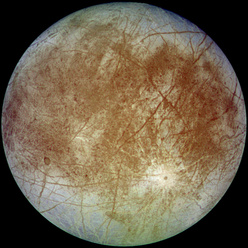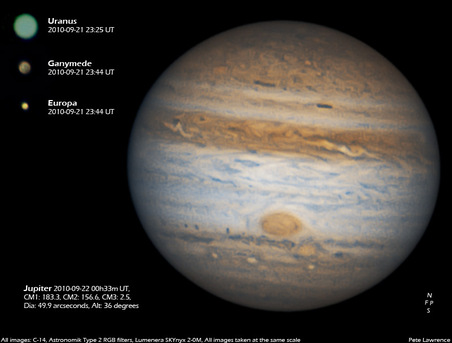
The European Space Agency plans to launch a real-life mission to Europa in 2022 to explore it and several other Jupiter moons as part of the Jupiter Icy moons Explorer mission, nicknamed JUICE. NASA will provide a radar instrument for the JUICE spacecraft to peer beneath Europa’s surface, but the mission will be completely robotic — no astronauts aboard. So it looks as if Wayfare’s “Europa Report” will be the closest humanity comes to a manned mission to Jupiter for the foreseeable future. Let’s hope the next try goes a bit better. –NBC News

The colonization of Europa presents numerous difficulties. One is the high level of radiation from Jupiter’s radiation belt, which is about 10 times as strong as Earth’s Van Allen radiation belts. As Europa receives 540 rem of radiation per day (500 rem is a fatal dose). A human would not survive at or near the surface of Europa for long without significant radiation shielding. Colonists on Europa would have to descend beneath the surface when Europa is not protected by Jupiter’s magnetotail, and stay in subsurface habitats. This would allow colonists to use Europa’s ice sheet to shield themselves from radiation. Another problem is that the surface temperature of Europa normally rests at −170 °C (103 K) (-275°F). However, the fact that liquid water is believed to exist below Europa’s icy surface, along with the fact that colonists would spend much of their time under the ice sheet in order to shield themselves from radiation, may somewhat mitigate the problems associated with low surface temperatures.
The low gravity of Europa may also present challenges to colonization efforts. The effects of low gravity on human health are still an active field of study, but can include symptoms such as loss of bone density, loss of muscle density, and a weakened immune system. Astronauts in Earth orbit have remained in microgravity for up to a year and more at a time. Effective countermeasures for the negative effects of low gravity are well-established, particularly an aggressive regimen of daily physical exercise. The variation in the negative effects of low gravity as a function of different levels of low gravity are not known, since all research in this area is restricted to humans in zero gravity. The same goes for the potential effects of low gravity on fetal and pediatric development. It has been hypothesized that children born and raised in low gravity would not be well adapted for life under the higher gravity of Earth.
It is also speculated that alien organisms may exist on Europa, possibly in the water underlying the moon’s ice shell. If this is true, human colonists may come into conflict with harmful microbes, or aggressive native life forms. More-recent studies have indicated that the action of solar radiation on the surface of Europa might produce oxygen, which could be pulled down into the subsurface ocean by upwelling of the interior. If this process occurs, Europa’s subsurface ocean could have an oxygen content equal to or greater than that of the Earth’s, possibly providing a home to more complex life. –Wikipedia
 RSS Feed
RSS Feed
